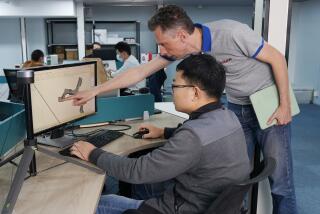Avon Will Go Calling On China Despite Political Controversy : Joint ventures: The cosmetics maker may be the first major U.S. firm to launch an operation there since the Tian An Men Square crackdown.
- Share via
Avon Products, the New York-based cosmetics firm plagued by poor earnings and takeover threats the past two years, is venturing where few American companies have gone recently: China.
Avon has formed a joint venture with the Guangzhou Cosmetics Factory in the southern city of Canton to manufacture and sell cosmetics. Avon executives already have begun to select equipment for the plant and to develop training materials for sales representatives and supervisors. The venture expects to launch sales operations by October.
The pace of international investment in China has slowed since the June, 1989, massacre of pro-democracy demonstrators at Tian An Men Square in Beijing. Asian trade consultants said the Avon deal may be the first major China venture by a U.S. firm since the showdown.
Some critics of China’s aging Communist leadership have urged U.S. businesses to forgo investment until Beijing shows signs of improving the human rights situation.
“Generally, U.S. companies concede--wherever one invests--that you have to take the human rights into consideration,” said Timothy Smith, executive director of the Interfaith Center on Corporate Responsibility, a New York-based coalition of church-related shareholder groups.
“Has the human rights situation (in China) improved?” he asked. “Is Avon following the human rights situation in China?”
But Smith conceded: “There has not been a groundswell of institutional investors asking companies to stay out of China.”
Avon President James Preston said he considered the views of those opposing new American investment in China before deciding to approve the venture.
“I decided that this was a commercial endeavor--not a political endeavor,” he said. “The venture will not benefit the government of China; it will benefit the women of China and Avon’s shareholders.”
Preston said Avon won’t make a profit the first three years, partly because of start-up costs.
Vice President John Novosad, who manages Avon’s Pacific operations from Hong Kong, said, however, that Avon considered breaking off its talks with the Chinese after the crackdown. “I saw the television reports of the violence, and my reaction was shock and disbelief.”
Novosad said he decided, however, that “the best way to ensure peace around the world is through economic growth.”
“When people have an opportunity for economic growth, they’re less likely to throw stones at each other,” he said. “I believe that strong economic growth and economic opportunities will be very beneficial to the Chinese people.”
Under the agreement, signed last January, Avon owns 60% of the joint venture. It is making an initial investment of $1 million and plans to increase its equity stake as more financing is needed.
Although the agreement allows for product distribution throughout China, the company plans to roll out its sales operation gradually. To start with, it will knock on the doors of about 10 million people in the Canton area. It will take its sales to other parts of the country later.
Avon will provide the venture with equipment, cosmetics formulas, technical expertise and sales and marketing programs. It is licensing technology and trademarks to the joint venture firm.
Avon plans to earn convertible foreign currency by exporting cosmetics. Initially, the venture will manufacture 80 to 90 skin-care and fragrance products.
The manufacturing facility will begin with about 50 workers, the company said. It will train 20 supervisors this summer and hopes to hire 2,000 sales representatives between October and March. The sales representatives would work on a commission basis.
The venture will pay off if it’s handled as well as Avon’s other foreign operations, said Andrew Shore, an analyst at Prudential-Bache Securities. Avon has large operations in Japan, Taiwan, Malaysia and the Philippines.
Avon’s sales abroad--the company operates throughout Europe, Latin American and parts of Asia--surpassed domestic sales in 1989. Foreign sales accounted for about $1.7 billion and U.S. operations about $1.6 billion in revenue.
“There’s more sales growth potential on the international side,” Shore said. “China could become a huge market.”
To be successful, however, Avon must develop a savvy marketing plan.
The company uses the slogan “Look how good you look now” in the United States. It may use the Japanese Avon slogan, “Right for your skin,” in China, company executives said.
Avon executives said that Chinese women, once encouraged to eschew makeup and Western wear in favor of boxy Mao suits, have been demanding colorful fashions and cosmetics.
The key to whether Avon is successful in China will be its sales force, executives say. They say Avon will be the first company to engage in the direct sale of mass-produced goods in China.
The general manager of the start-up effort is a Hong Kong Chinese born in Canton. The 12-year Avon veteran has managed the company’s Taiwan purchasing operations.
Avon’s entry into China does not portend a near-term investment pattern because China is still too unstable for many potential investors, said Mike Van Horn, a San Francisco trade consultant who specializes in Asian investment. The author of “Pacific Rim Trade,” a guide book on Asian trade, said he has seen a number of American firms pull out of potential deals in China since the Tian An Men massacre.
“American firms are frightened because they sense the uncertainty in China,” he said. “Avon’s venture is risky because you don’t know what’s going to happen in China; but it’s a prudent risk because Avon has so much experience in Asia.”
More to Read
Inside the business of entertainment
The Wide Shot brings you news, analysis and insights on everything from streaming wars to production — and what it all means for the future.
You may occasionally receive promotional content from the Los Angeles Times.










